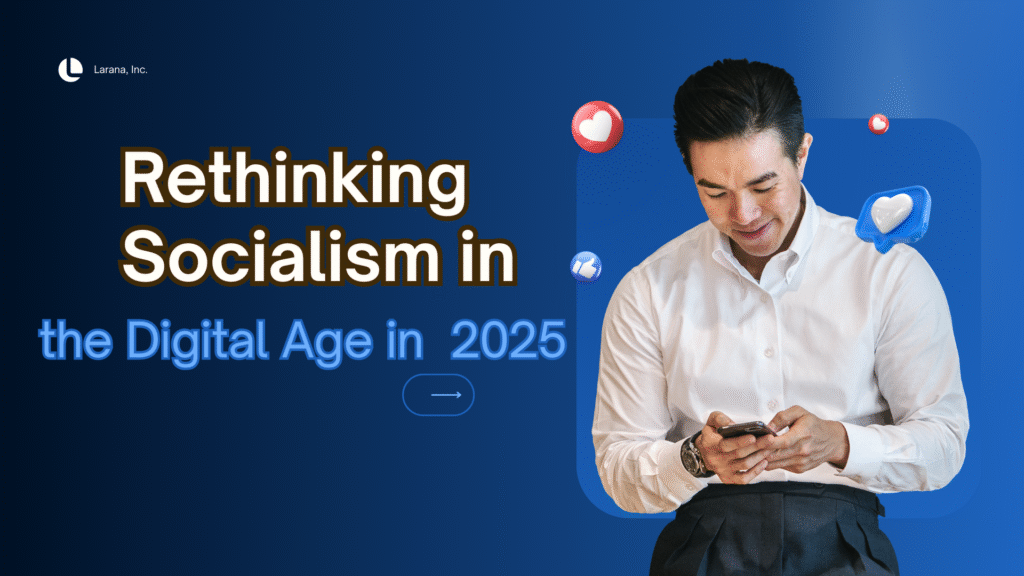|
Getting your Trinity Audio player ready...
|
For over a century, socialism has been understood in terms of factories, land, railroads, and natural resources—the tangible “means of production.” But in today’s digital economy, those classical categories look increasingly outdated. We must ask: what are the means of production in the 21st century, and what does socialism mean when production happens in clouds and code rather than in coal mines and steel mills?
What Are the Means of Production in the Digital World?

In the digital economy, the primary productive assets are not physical machines but infrastructure and knowledge:
- Cloud computing platforms: AWS, Google Cloud, Azure and their analogues are the “factories” of the digital age. They provide the computing power that drives almost every modern industry.
- Software and algorithms: Operating systems, programming frameworks, and AI models are productive engines as important as assembly lines once were.
- Research institutions: Knowledge generation itself is a form of production. Universities, labs, and think tanks produce intellectual capital, which is then transformed into digital tools, medicines, and patents.
If Marx once said that ownership of mills and mines determines class structure, today we might say that ownership of cloud infrastructure and intellectual property defines new digital classes.
Social Justice Versus Ownership
Traditionally, socialism argued that justice requires abolishing private ownership of the means of production. Yet in the digital era, ownership becomes more ambiguous. One person with the right algorithms, or the right mathematical insight, could generate trillions in economic value.
An AI once suggested that a mathematician’s fair salary might be $6 trillion per year—a figure so astronomical that it cannot be spent on personal consumption. The only real use for such income would be purchasing means of production: buying cloud platforms, funding research labs, or acquiring global IP portfolios.
This highlights a paradox:
- If socialism demands equal justice in income, then extraordinary contributors must be compensated fairly—even if that means giving them capital-like salaries.
- If socialism demands abolition of ownership, then such salaries would be forbidden, because they inevitably turn into control over production.
Thus, socialism in the digital age appears to split into two possible branches:
- Fair Salaries Socialism – where individuals can receive immense but justified compensation for unique contributions, even if it gives them disproportionate economic power.
- No-Ownership Socialism – where individuals are denied such compensation to preserve communal control, even at the cost of perceived injustice toward exceptional talent.
Is Effective Socialism Possible?
This dilemma raises the deeper question: can socialism, as traditionally imagined, truly function in a world where the value of human knowledge and creativity is so unevenly distributed?
- In the 19th century, factory workforces were relatively interchangeable; no one weaver or coal miner could claim orders of magnitude more value than another.
- In the 21st century, however, a single discovery in mathematics, AI, or biotechnology may outproduce entire industries.
If socialism cannot resolve this contradiction—between social justice and collective ownership—then perhaps capitalism, with all its flaws, is not merely persistent but inevitable. Capitalism already allows extraordinary individuals to accumulate wealth proportional to their contributions, though often in unjust and chaotic ways.
Yet abandoning socialism altogether may be premature. A more nuanced future could involve:
- Hybrid systems where collective institutions own infrastructure but individuals are richly rewarded for knowledge creation.
- Digital cooperatives where intellectual property is pooled, and contributors receive dividends proportional to their impact.
- Blockchain-based DAOs (Decentralized Autonomous Organizations) that transparently measure and distribute value without consolidating ownership in traditional capitalist terms.
Conclusion
Socialism in the digital age must be rethought. The cloud is our new factory; research labs are our new mines; mathematicians and AI engineers may be our most “productive workers.” But socialism faces a structural paradox: either embrace fair but extreme inequalities in compensation, or suppress them at the cost of injustice to extraordinary contributors.
This does not mean that capitalism “wins by default.” Rather, it means the next stage of social thought will have to go beyond both 19th-century socialism and 20th-century capitalism, towards a system that recognizes knowledge as the supreme means of production—while still striving for justice.
Donate for a modern form of wealth redistribution AI Internet-Meritocracy (AIIS) app.
Ads:
| Description | Action |
|---|---|
|
A Brief History of Time
A landmark volume in science writing exploring cosmology, black holes, and the nature of the universe in accessible language. |
Check Price |
|
Astrophysics for People in a Hurry
Tyson brings the universe down to Earth clearly, with wit and charm, in chapters you can read anytime, anywhere. |
Check Price |
|
Raspberry Pi Starter Kits
Inexpensive computers designed to promote basic computer science education. Buying kits supports this ecosystem. |
View Options |
|
Free as in Freedom: Richard Stallman's Crusade
A detailed history of the free software movement, essential reading for understanding the philosophy behind open source. |
Check Price |
As an Amazon Associate I earn from qualifying purchases resulting from links on this page.

